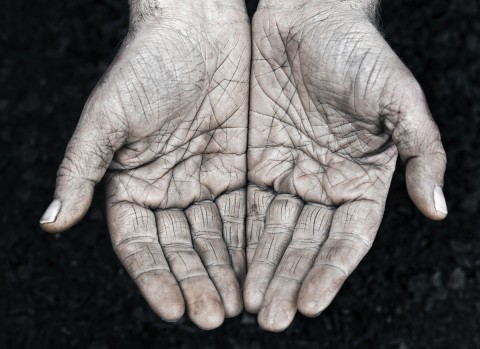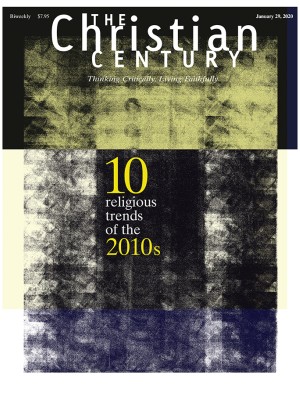The dirty work of ministry
What two drastically different messages from parishioners taught me

Some people are quick to judge, and some remarks are designed to hurt. A month ago I received a letter from someone I haven’t met but who is nonetheless convinced of all my faults and more. She wrote to tell me how outraged she was about how she sees our church approaching its work in the local community.
My chief sin, it turns out, is that I’m not a certain predecessor of mine. “You have turned that lovely, caring community run by lovely gentle gentlemen in my time, into a modern-day business, bent on efficiency,” she asserted. It seems the glorious amateurs have been replaced by hard-nosed professionals—me chief among them. “When I think of the saints who worked there, I could weep.” The rhetorical dial went up a couple of notches: “Shame on you.” And then the big ending: “Don’t sleep easy in your bed tonight. And tomorrow roll up your sleeves and do some of the dirty work.”
Read our latest issue or browse back issues.
She didn’t explain precisely what this dirty work is. It took me back to a rather conflictual relationship many years ago, when a parishioner detonated the nuclear judgment: “You have failed this community as a priest.” No answer to that. The scar abides.
I got an insight into the dirty work later the same day. I put the letter to one side, ready to burst the balloon should my ego ever inflate to dangerous levels. But then I got a message from a person whom a couple of years ago I got to know very well, in a way only a pastor really can. He was experiencing one of the worst things a person can ever go through. His daughter, age just 24, had injected a recreational drug that turned out to have been contaminated. She went into a coma and never emerged; she died a month later. Her funeral was one of the toughest challenges I’ve had in ministry.
What do you say in the face of such indescribable tragedy? A lively young woman dying an absurd and pointless death, shrouded in grief, horror, and shame. It seemed her father had felt I’d gotten something right, because the same evening I got the poison-ink letter I was on the phone with him and he was asking me to take his brother’s funeral, too.
This gentle man, for whom losing a brother compounded the loss of his vivacious daughter, later sent me one of the most extraordinary messages I’ve ever received. He reminded me that at his daughter’s service I’d preached on the words from the Song of Solomon, “Set me as a seal upon your heart, a seal upon your arm; for love is strong as death.” I’d said, apparently, that the whole Bible was in this sentence, that the Christian faith rests on the belief that love is stronger than death and that Christian hope is simply this: that we are a seal upon God’s heart.
It was starting to come back to me now. But his message went on: “At her funeral, her brother was so upset that I wondered whether he’d taken much of it in. For the rest of that summer he withdrew from us and from most people. Some weeks later he acquired, on the inside of his right forearm, an indecipherable tattoo. It turned out that he’d asked my wife, in her beautiful handwriting, to write eight short words, which he’d then had permanently tattooed in mirror image. He decided on mirror image, he said, ‘because I don’t want people knowing my business.’ The eight words were, ‘Set me as a seal upon your heart.’ The tattoo looks like a blur in ordinary sight. The words emerge for my son when he holds his arm up before a mirror. And of course the verse continues: ‘as a seal upon your arm.’”
I didn’t know what to say. How can we know what ministry truly means to people, since we so seldom ask them to roll up their sleeves and provide the evidence? But what I do know is this: Christ rolls up his sleeves in ministry around Galilee. In Jerusalem he rolls up his sleeves and bares his arm and shows us that love is strong as death, passion as fierce as the grave. Tattooed on his arm is our name—my name, Sam, and yours as you read this—but the names look like a blur and are indecipherable, probably because he didn’t want people knowing his business. And on the cross Christ sets us as a seal upon his heart, and we’re sealed on that arm forever—you, me, that daughter, her father and her brother.
And the woman who wrote me the poison letter. Her name is written in the indecipherable tattoo on Christ’s arm, too. She wanted me to roll up my sleeves and do some of the dirty work. What the bereaved father’s extraordinary message told me is that Christ has already done it. Any work I might do, clean or dirty, is simply a celebration of that.
If people are furious with me, they’ve probably projected onto me a host of the world’s ills I can do little to assuage. They may be right to be furious with me, although they’re invariably furious about the wrong things. But if the Holy Spirit turns their fury into a vision of what it means to be set as a seal upon Christ’s heart, like a tattoo upon his arm, then all I can do is roll up my sleeves and say, bring it on.







